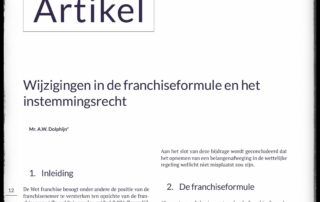Mitigation of fine due to ‘dominant position’ of franchisor
Mitigation of fine due to ‘dominant position’ of franchisor
In a recent judgment by the Arnhem-Leeuwarden Court of Appeal, the court greatly moderated the fines for violations of the non-competition and confidentiality clause. The court refers, among other things, to the Franchise Act and the unequal position between franchisor and franchisee, which is explained in the explanatory memorandum.
Facts
- On September 20, 2016, the parties entered into a franchise agreement with a term until May 31, 2021 for the operation of a football equipment store. As usual, this franchise agreement includes a non-competition clause and a confidentiality clause. Violation of these clauses is sanctioned in the agreement with a fine. Under the franchise agreement, the franchisee had the option to purchase from the purchasing organization Euretco under favorable purchasing conditions.
- In mid-2020, the franchisor (Football Retail) entered into a partnership with the 11Teamsports formula and in that context, a new franchise agreement was presented to the franchisees on June 4, 2020, with which they would join this formula. Franchisees were informed that there would be consequences if they did not sign this agreement by June 5, 2020. For example, franchisees would no longer be allowed to purchase from Euretco at favorable rates and they would no longer be allowed to carry certain items.
- However, the franchisee does not sign and in September 2020 the franchisor will receive another request to sign the agreement. Once again a deadline was set, this time it had to be signed no later than September 30, 2020. The franchisee again does not sign and informs Football Retail by letter dated December 2, 2020 that after deliberation he has decided to cancel the franchise agreement with effect from January 1, 2021.
- Football Retail has stated that it does not accept the cancellation. The franchisee would be required to comply with the franchise agreement for the remaining term until May 31, 2021.
- From mid-December 2020 to May 1, 2021, the franchisee’s store will be closed by government order due to the corona measures.
- The franchisee has stopped paying the formula contribution and has left an amount of more than EUR 8,000 unpaid in the period from January 1 to May 31, 2021.
- Furthermore, the franchisee’s Facebook page shows that he has joined a competing formula as of February 11, 2021. The franchisor demands to stop this and claims the fine.
In the appeal, the court ruled that the franchisee wrongfully terminated the franchise agreement prematurely. The court also ruled that the franchisee violated the non-compete clause by joining a competing formula. The confidentiality clause is also violated by sharing the purchase prices and discounts that Football Retail uses. Based on these violations, the franchisee owes the fines included in the franchise agreement.
The next question is whether there are circumstances that require moderation of the fine?
Article 6:94 paragraph 1 of the Dutch Civil Code stipulates that the court may moderate the stipulated fine at the request of the debtor, if fairness so requires. On the other hand, the creditor may under no circumstances receive less money than on the basis of the compensation according to the law. The judge can only use its power to mitigate if the penalty clause produces an excessive and unacceptable result in the given circumstances. Account must be taken of the relationship between the actual damage and the amount of the fine, the nature of the agreement, the content and purpose of the clause, and the circumstances in which it was invoked.
In its judgment – whether there should be a mitigation of the contractual fine – the court refers to the explanatory memorandum to the Franchise Act with regard to the unbalanced relationship between franchisor and franchisee:
“Within the franchise relationship, there is naturally a certain dominance of the franchisor over the franchisee. This dominance mainly results from its position as the rightful owner of the franchise formula. Although the franchisee is formally an independent entrepreneur, in practice he is relatively dependent on the franchisor, because the franchisor is the determining factor with regard to the franchise formula and further course determination. The franchise relationship is, in a sense, intrinsically unequal. This in itself is not problematic, but in practice it often appears that the way in which the franchisor uses its dominance can lead to unreasonable and undesirable situations for the franchisee.”
In this case, the franchisor has exerted pressure on the franchisee (including by removing purchasing benefits from Euretco) to agree to an amended franchise system and contract. This disrupted the relationship between both parties and the franchisee subsequently looked for alternatives.
According to the court, it was obvious that the franchisee, who had to rely on the football store for his livelihood and was also affected by the lockdown, had to do something and that he therefore started looking for alternatives. This is how he ended up at Badge/Voetbalshop and in 2021 he gradually promoted himself more and more with Voetbalshop after the franchise agreement expired. This creates competition and the franchisee should of course also have maintained confidentiality regarding price formation. But on the way to the exit from the franchise agreement forced by Football Retail, these violations of franchise loyalty carry less weight. Football Retail has not alleged any financial damage, but it has claimed that its formula would lose effectiveness due to the behavior of the franchisee. However, this is all only of relative significance because Football Retail was itself in a transition process towards 11Teamsports at the time, achieved this on April 15, 2021 and offered its franchisees the choice to transfer. According to the court, the requested fines are therefore in no reasonable proportion in terms of size to the alleged damage. The court significantly moderates the fines and limits them to EUR 18,000 in total instead of EUR 145,000.
In addition, the claimed formula contribution will be reduced by 50% due to unforeseen circumstances (corona and government measures).
Lesson for practice?
All in all, this is a remarkable case for several reasons. There is a lot of room for negotiation regarding the actions of both the franchisor and the franchisee and the question arises whether they have received legal advice prior to their actions.
For example, it is not clear on what grounds the franchisor could enforce interim changes to the franchise agreement. In any case, it seems unlawful to me to suspend services before the end of the term of the franchise agreement. It would have been more logical to terminate the franchise agreement towards the end of the term.
On the other hand, the franchisee could have given notice of default to the franchisor following the (threat of) suspension of certain services (in this case the closure or limitation of purchasing channels) and on that basis could have suspended its payment obligation and, in the event of continued failure, possibly even can terminate the franchise agreement. In my view, in the event of a lawful suspension or dissolution, the court would not have established a violation of the non-compete clause.
Be that as it may, their actions have generated interesting considerations from the court. It can be read that the court has looked for starting points to moderate the fines and has consulted the explanatory memorandum to the Franchise Act. In addition to the unequal position highlighted by the court, the obligation of the franchisor and the franchisee to behave on both sides as a good franchisor and franchisee could also have been pointed out. However, all this does not alter the fact that violating the non-compete and confidentiality clause can be disastrous for franchisors. In my opinion, the fact that the court was able to reduce the fines to this extent in this case is partly due to the fact that the franchisor’s formula has been abolished and the damage has therefore remained limited.
Remy Albers – Franchise lawyer
Ludwig & Van Dam franchise lawyers
Do you want to respond? Send an email to albers@ludwigvandam.nl
Ludwig & Van Dam lawyers, franchise legal advice.
Do you want to respond? Then email to albers@ludwigvandam.nl

Other messages
Belgian Council of Ministers adopts decision to protect independent supermarket entrepreneurs
All-powerful supermarket organizations Partly due to the recent privatization of ...
Mitigation of fine due to ‘dominant position’ of franchisor
Mitigation of fine due to 'dominant position' of franchisor ...
It is a non-competition clause at the end of the lease
In the judgment of 26 March 2024, ECLI:NL:GHSHE:2024:1035, the Court ...
Looking ahead: Bottlenecks at the end of the franchise agreement
Of course, everyone starts a collaboration with good courage. But ...
Not just a successful appeal to incorrect forecasts
Not just a successful appeal to incorrect forecasts Introduction ...
Changes to the franchise formula and the right of consent
An article by Mr. was published in the leading legal ...







